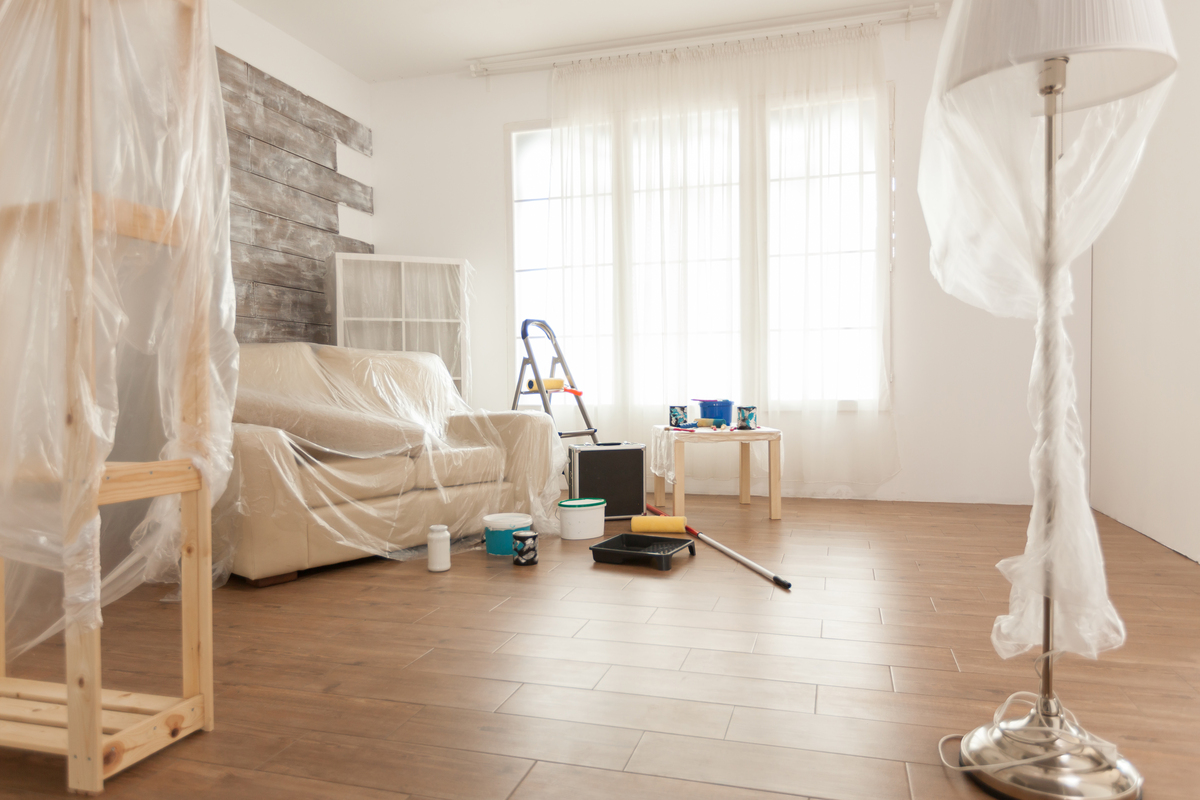Home for renovation project, while promising a rejuvenated living space, comes with its own challenges. Embarking on such a project requires more than just a vision; it demands meticulous planning, a grasp of logistics, and the anticipation of potential hurdles. Whether you’re sprucing up a single room or overhauling your entire residence, understanding the nuances of preparation can make a difference between a smooth transition and a tumultuous journey. This guide aims to equip homeowners with practical insights and actionable tips to set the stage for a successful renovation adventure.
Understand the Scope of Home for Renovation Project
Understanding the scope is fundamental before embarking on a home renovation project. Start by pinpointing which areas of your house are to be renovated. Are you focusing on just the kitchen and bathroom, or does the renovation encompass the entire home? Be as specific as possible, from wall adjustments to window placements.
After restricting the areas, move on to setting clear goals and objectives. Ask yourself: What do I hope to achieve with this renovation? Maybe you’re aiming for a more modern look and increased functionality or boosting your property’s market value. By having distinct goals, you’ll provide yourself and the contractor with a roadmap, ensuring the final result aligns with your vision.
Setting the parameters for the renovation project not only aids in crafting a budget but also assists in keeping the project on track. Whether you desire additional space, enhanced aesthetics, or to fix existing problems, these objectives will act as your compass. They’ll guide every decision, from material choices to design aesthetics, ensuring that every step resonates with your desired outcome. As you engage in this preparatory phase, envision the result and let that vision lead the renovation journey.
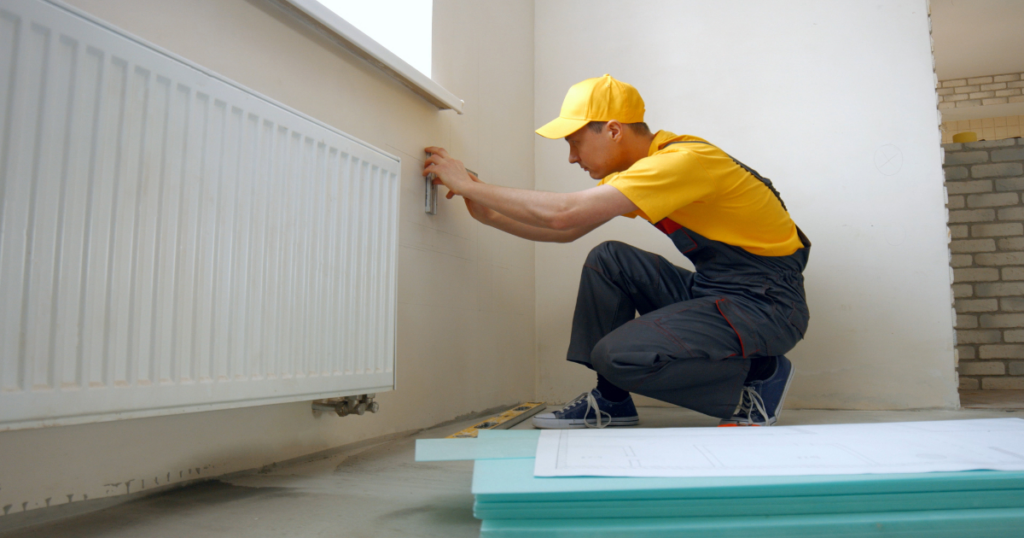
Set a Budget and Timeline
Laying out a financial plan is a cornerstone for any home renovation project. Begin by investigating the average costs associated with renovations similar to yours. Online platforms, home improvement stores, or expert consultations can offer valuable insights into current market rates. However, while initial estimates give a ballpark figure, it’s always wise to account for unexpected expenses. Renovations often have unforeseen challenges, from hidden structural issues to last-minute design changes. Therefore, padding your budget with an additional 10-20% can provide a safety net for such surprises.
Equally important to your budget is establishing a realistic timeline. Decide on a clear start date, considering factors like contractor availability and material delivery times. Once the commencement date is set, work with your contractor to project an end date. This gives you a sense of the project’s duration and helps manage accommodations if certain areas of your home become temporarily unusable. Remember, while it’s tempting to desire a swift renovation, quality work takes time. Hence, ensure that the timeline balances efficiency and excellence, offering a revamped space worth every day invested.
Choose a Trustworthy Contractor
Selecting the right contractor is pivotal for the success of your home renovation. Word of mouth is one of the most reliable ways to find a reputable contractor. Friends and family can provide firsthand accounts of their experiences, shedding light on the contractor’s quality of work, reliability, and professionalism. Their insights can point you towards contractors who have proven their worth or steer you away from those who fell short of expectations.
However, don’t solely rely on personal recommendations. The digital age offers a plethora of online review platforms where previous clients share their experiences. Browsing these reviews can give you a broader perspective on the contractor’s reputation in the community. Look for patterns in feedback; consistent praises or grievances can indicate the contractor’s strengths or areas of concern.
Once you’ve shortlisted potential contractors, initiate a face-to-face interview. This meeting allows you to gauge their expertise, understand their approach, and discuss your project’s specifics. During the interview, ask for references from past projects. Speaking directly to these references can give you an unfiltered view of the contractor’s work ethic and the timeliness of the finished product. By diligently following these steps, you increase the likelihood of hiring a contractor who aligns with your renovation vision and standards.

Secure Necessary Permits
Navigating the legal side of a renovation is as vital as the aesthetic and functional aspects. Every municipality has regulations and building codes that homeowners must adhere to, especially during major renovations. Before initiating any work, familiarize yourself with the local regulations. This might mean visiting your local municipal or city office or browsing their online resources. Some places might require permits for tasks as simple as changing plumbing fixtures, while others might have more lenient stipulations.
Once you’re well-versed with the required codes, obtain the necessary permits. This often involves submitting detailed plans of your proposed changes, so it’s beneficial to involve your contractor in this step, given their experience in the area. Remember that obtaining a permit might come with associated fees, so factor these into your budget.
Additionally, be attentive to any specific restrictions or guidelines for the permits. For instance, certain historical districts might have stringent guidelines on external renovations to preserve the area’s character. Or, there might be limits on the hours during which construction work is permissible. Abiding by these rules ensures a smooth renovation process and prevents potential legal complications. Ensuring all necessary permits and adhering to guidelines lays a strong foundation for a hassle-free renovation journey.
Clear Out Affected Areas
Before the hum of construction begins, prepping the renovation space is a must. Start by removing all furniture and personal items from the affected areas. This creates a blank canvas for the workers and safeguards your belongings from potential damage, dust, and debris. While small items can easily be boxed and stored, larger pieces like sofas or beds might require more planning.
Consider alternative storage solutions for belongings that can’t easily be accommodated elsewhere. Renting storage can be an effective way to temporarily house larger furniture pieces or valuable items you want to keep protected. If you anticipate a prolonged renovation, looking into monthly storage rental options might be economical. Alternatively, if you have generous friends or family nearby with some spare space, they might be willing to help you with the renovation.
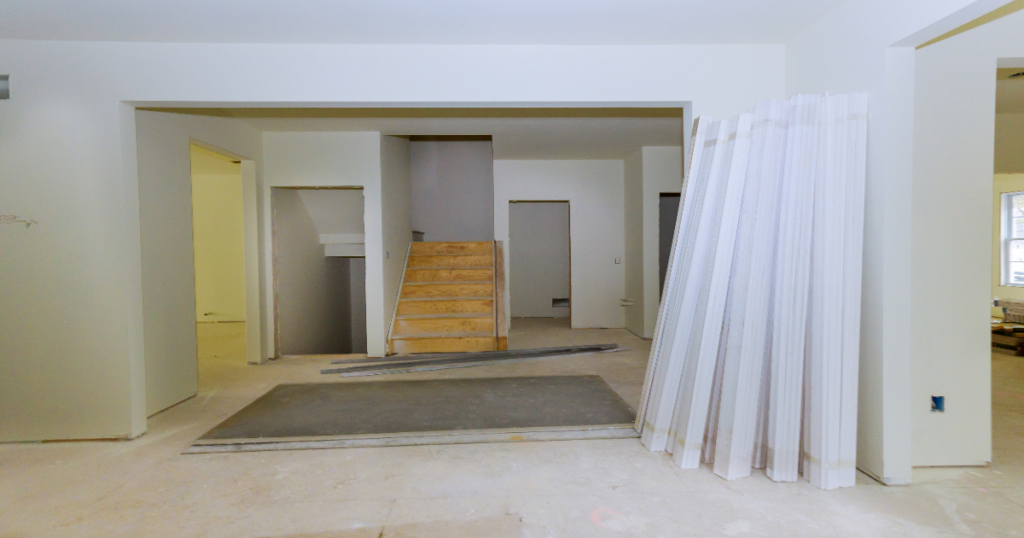
Protect Areas Not Being Renovated
Even if only a segment of your home is renovated, the ripple effects can touch other parts. Dust, debris, and general wear and tear from foot traffic can impact areas not directly involved in the renovation. To mitigate these side effects, it’s vital to take protective measures.
Begin with your furniture and appliances in the vicinity of the renovation. Covering them with plastic or dust sheets can shield them from dust and paint splatters. These covers, readily available at hardware or home improvement stores, act as a barrier, preventing scratches, stains, and dust accumulation.
Next, consider the adjacent rooms or areas not part of the renovation. Using plastic barriers or tarps to seal off doorways or open entrances can be extremely effective. This acts as a deterrent, limiting the spread of dust and debris into these spaces. Think of it as creating a controlled environment where the renovation mess is contained as much as possible.
Floors, especially if they’re hardwood or carpeted, require special attention. Foot traffic, tools, and materials can be hard on these surfaces. Lay down protective sheets, tarps, or specialized floor protectors to prevent scratches, stains, or other potential damages. These protective layers are especially critical in high-traffic pathways where workers frequently move tools or materials.
Inform Neighbors and Set Boundaries
A home renovation, while exciting for the homeowner, can also impact those living nearby. The sounds of drilling, hammering, and machinery can disrupt the neighborhood’s tranquility. Keeping neighbors in the loop is a considerate step to foster good relations and minimize inconveniences. Informing them about the upcoming project, its duration, and the potential noise can help them prepare or adjust their schedules accordingly. This gesture promotes understanding and can garner goodwill, which can be invaluable if minor issues arise during the project.
Setting boundaries is equally essential. Collaborate with your contractor to establish agreeable working hours. While you might be eager to get the renovation done quickly, starting construction too early in the morning or extending it late into the evening can strain neighborly relations. It’s best to align these hours with local noise ordinances or community guidelines and consider the general routines of those living nearby. For instance, if a neighbor works night shifts and sleeps during the day, adjusting the noisiest tasks to their wake hours can be a thoughtful gesture.
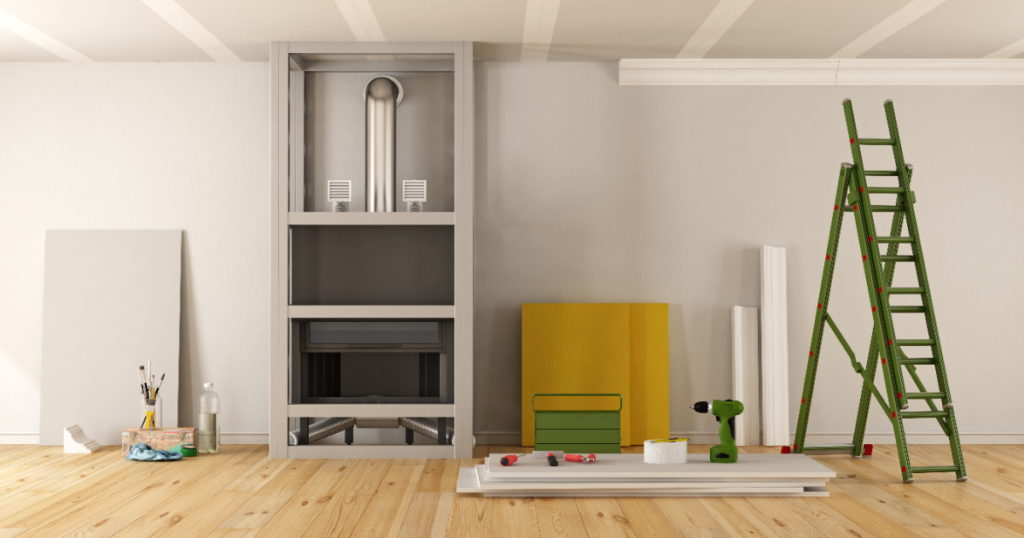
Plan for Waste Management
A renovation project, regardless of its size, generates waste. From discarded materials to packaging, the debris can quickly accumulate. A waste management strategy ensures that the site remains tidy and the disposal process is efficient and environmentally friendly.
One primary step is determining how the waste will be collected. Renting a dumpster is a common solution for sizable projects. Available in various sizes, these can be positioned conveniently on your property, providing a central location for all waste. Before making a rental decision, assess the estimated volume of waste your project will generate. This assessment will help you choose the right size and avoid multiple rental costs or overflow issues.
But it’s not just about collecting waste; it’s also about responsible disposal. As you discard materials, try to separate recyclable items from the general trash. Many renovation materials, such as metals, certain plastics, and clean wood, can be recycled. Setting up separate bins or areas for these recyclables ensures they don’t end up in landfills, promoting eco-friendly practices.
Some discarded items, like old appliances or fixtures, might still be in working condition. Consider donating to local charities or organizations. Not only does this reduce waste, but it also helps support community members in need.
Prepare for Daily Life Disruptions
Renovations, while ultimately rewarding, can temporarily turn daily routines upside down. Key areas of your home may become inaccessible, and the usual rhythm of life can be disrupted. Anticipating these changes and making preparations can significantly reduce stress and make the renovation journey more bearable.
For example, if your kitchen is being renovated, it might mean several days or weeks without a functional cooking space. In such cases, setting up a temporary kitchen can be a lifesaver. This could be as simple as a designated corner in your living room with essential appliances like a microwave, toaster, and a mini-fridge. Stock up on easy-to-prepare meals and disposable dishes, or even plan for regular takeout to ensure meal times remain hassle-free.
Routine adjustments are almost inevitable during renovations. If you usually work or study from home, the noise and interruptions might make focusing challenging. Identifying quieter hours or setting up a temporary workspace in a less affected area of the house can help. For flexible schedules, shifting work or study hours to times when the contractors aren’t active might offer some reprieve.
It might even be worth considering moving out temporarily in certain extensive renovations. While this might seem drastic, it can be a practical choice for projects that render significant portions of the home unusable. This could mean staying with relatives, booking a short-term rental, or considering a hotel stay. While this adds to the renovation’s overall cost, its comfort and peace of mind often justify the expense.
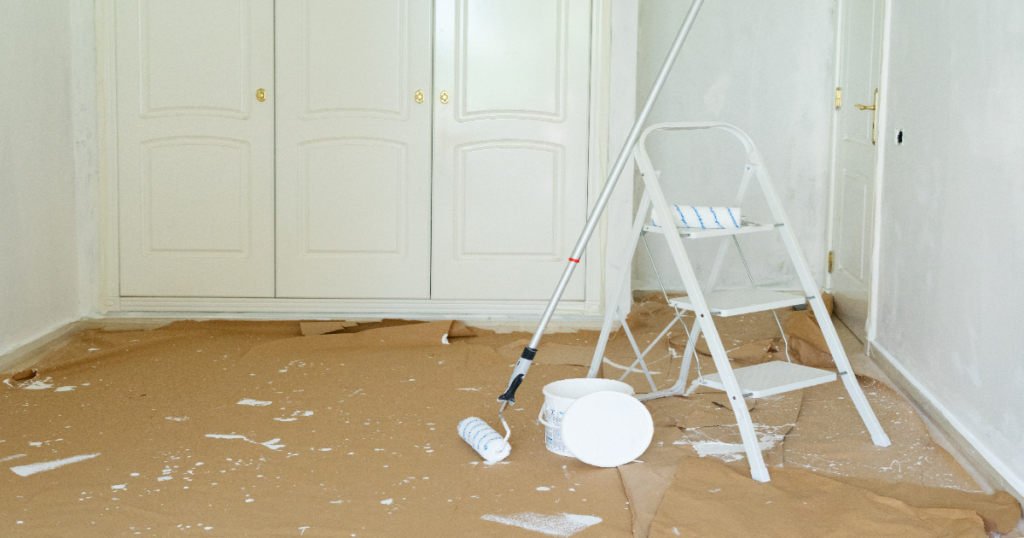
Safety Preparations
Safety should never be an afterthought, especially during a renovation where the environment can be filled with potential hazards. Taking preventive measures ensures the process is smooth and safe for everyone involved.
A first aid kit is one of the primary tools to have on hand. Minor injuries like cuts, bruises, or scrapes can occur despite best efforts. A well-stocked first aid kit ensures that such injuries can be addressed immediately, minimizing their severity.
Tools and hazardous materials, common in renovations, can pose risks, especially if you have curious children or pets. Always store these items securely after use. This might mean locking them in a designated storage room or using safety latches and locks on storage cabinets. It’s not just about keeping sharp or powerful tools out of reach; paints, solvents, and other chemicals can be harmful if ingested or improperly handled. Proper storage reduces the risk of accidents and ensures these materials maintain their efficacy and quality.
With multiple people working and an ever-changing environment, it’s important to establish clear paths for movement. Avoid leaving tools, materials, or debris in walkways. Clearing these paths reduces the risk of trips or falls. Having designated areas for work and breaks is also beneficial, ensuring no confusion or overlap. If certain areas are particularly risky, consider setting up temporary barriers or signage to keep family members or visitors away.
A renovation is a significant undertaking, and while the end goal is to enhance a living space, the journey should prioritize the safety of everyone involved. Proactive measures and a vigilant attitude towards safety can make the process efficient and accident-free.
Stay Flexible and Adaptable
Renovation projects, with all their intricacies, rarely unfold exactly as planned. From unforeseen structural issues to material availability challenges, there’s always an element of unpredictability. Embracing flexibility and adaptability becomes instrumental in navigating these uncertainties without compromising the project’s success or your peace of mind.
While meticulous planning sets the trajectory for the renovation, unexpected challenges can and often do arise. Perhaps it’s an old plumbing issue discovered behind a wall or a delay in delivering crucial material. Instead of seeing these as setbacks, view them as part and parcel of the renovation journey. Being mentally prepared for such surprises makes it easier to handle them when they occur.
Flexibility also means being open to slight deviations from the original plan. Maybe the paint shade you chose isn’t looking as you envisioned, or the chosen fixtures aren’t available. In such instances, having an open mind and considering alternative options can keep the project moving forward without compromising the overall vision.
Lastly, remember the value of the expertise you’ve hired. Your contractor brings experience and knowledge to the table. They’ve likely faced and overcome numerous challenges in previous projects. Trusting their expertise and listening to their suggestions can often lead to solutions in the project’s best interest. They can provide valuable insights and alternative solutions when facing obstacles.
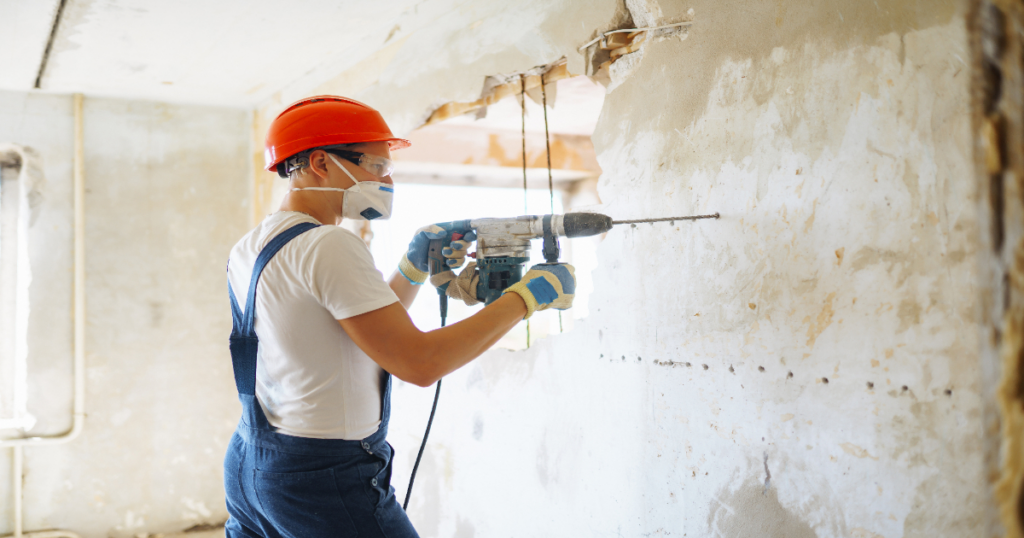
FAQ Section
Do I Always Need a Permit for Renovations?
Not always, but many significant changes, especially those involving structural alterations or changes to the home’s footprint, often require permits. Always check with local regulations to be certain.
How Do I Manage Living in My Home During a Renovation?
A: It involves a mix of preparation and adaptability. Setting up temporary spaces, adjusting routines, and possibly considering short-term relocation for extensive renovations can help.
How Do I Ensure My Belongings Are Safe During the Renovation?
Clearing out the renovation area, covering items with dust sheets, and possibly using storage units can help protect your belongings.
What’s the Best Way to Stay Eco-Friendly During a Renovation?
Choose sustainable materials, separate waste for recycling, and consider energy-efficient upgrades. Discussing eco-friendly options with your contractor can also yield valuable suggestions.
Can I Continue Using My Home’s Utilities During the Renovation?
In most cases, there might be short periods when utilities must be turned off, especially if they’re being updated or relocated. Your contractor will usually notify you in advance.
References
Plan The Scope Of Home Renovation

